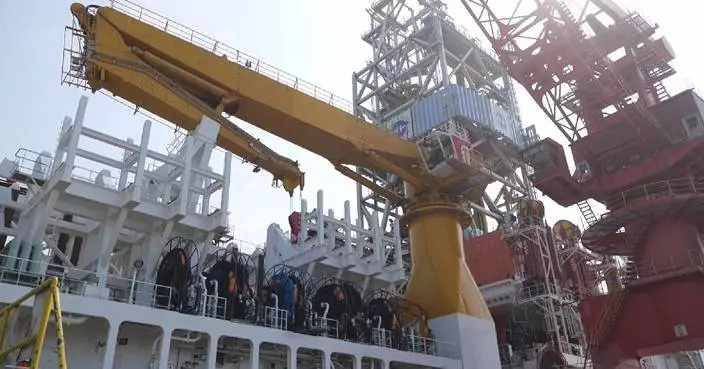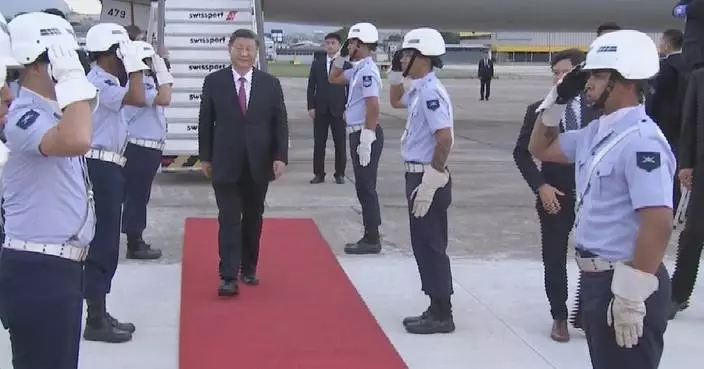China saw its express delivery volume in 2024 surpass the 150-billion-parcel mark for the first time as of Sunday, according to the State Post Bureau, as the country's booming courier market has remained prosperous and active.
According to the bureau, this year, the average express deliveries received per person in China has exceeded 100, with over 5,400 express packages generated per second on average. The highest daily express delivery volume has surpassed 729 million.
Since the beginning of this year, various departments and regions have rolled out supportive policies to stimulate consumption and enhance domestic demand.
Policies including equipment upgrades and trade-in programs for consumer goods have contributed to a significant increase in the volume of express deliveries.
"This year, China's express delivery industry has accelerated the upgrading of its infrastructure. Express companies have been establishing and operating transfer centers and smart supply chain industrial parks in various county-level areas, and renovating distribution centers. By deploying intelligent sorting equipment and expanding operational spaces, they have significantly improved the efficiency of sorting and shortened delivery times," said Wang Yuehan, director of the Industrial Economic Research Department at the Development Research Center of the State Post Bureau.
According to the director, the regional development structure of the postal and express delivery industry has become more balanced this year, with a continuous increase in the proportion of express delivery volume in the central and western regions.
Collaborations between e-commerce platforms and express companies in remote areas have reduced costs and stimulated the market potential in the central and western regions.
"Since the beginning of this year, the express delivery market in the central and western regions has seen growth rates surpassing the national average, with provinces like Gansu and Shaanxi increasing over 40 percent. The robust development of the express delivery market has played a crucial role in expanding online consumption demand in these regions, providing significant support for strengthening local economies and reinforcing the positive trend of economic recovery," said Wang.

China's annual express delivery volume tops 150 bln pieces for first time
It will be a must-do for Chinese automakers to operate on an international scale as the country's globally leading production capacity continues to grow, said exhibitors at the ongoing 22nd Guangzhou International Automobile Exhibition that runs from November 15 to 24 in Guangzhou City, south China's Guangdong Province.
With a month and a half left in the year, China's annual output of new-energy vehicles has already surpassed the 10-million mark as of Thursday, making it the first country to achieve this milestone, according to data from industry group China Association of Automobile Manufacturers (CAAM).
China became the world's largest auto exporter in 2023 and is expected to secure the position this year. In the first 10 months of the year, the country exported 4.855 million cars, up 23.8 year on year.
However, many exhibitors at the auto show have noted that it's not sustainable for Chinese automakers to rely solely on exports. They are now also investing and building factories overseas, while developing logistics, finance and after-sales services businesses and building supply chains in some countries.
"Our plant in Thailand has begun operation. The plants in Indonesia and Malaysia will start operation next year. In the meantime, we are also making arrangements in Europe and North America," said Gu Huinan, general manager of GAC Aion New Energy Automobile Company.
While continuing to deepen their overseas strategies, Chinese automakers have also attached importance to the protection of intellectual property.
"BYD has always attached great importance to technological innovation and intellectual property protection. To date, we have applied for more than 57,000 patents in China and more than 12,000 patents overseas," said Zhao Jie, senior manager of Intellectual Property Department of BYD.
Earlier this month, the State Administration for Market Regulation, China's top market regulator, issued guidelines for strengthening regulations on antitrust behaviors pertaining to standard essential patents.
With rules clearly laid out, the guidelines will help promote fair market competition and protect the driving forces of industrial innovation and development, according to the administration.
"The guidelines have filled the institutional gap in China's supervision of standard essential patents and provided a clear legal basis. In the future, automakers should actively strengthen international intellectual property cooperation and demonstrate the technological innovation capabilities of China's automobile industry in global competition," said Wang Junlei, chief expert of the China Automotive Technology and Research Center.

Going global a must-do for Chinese automakers amid growing production capacity










